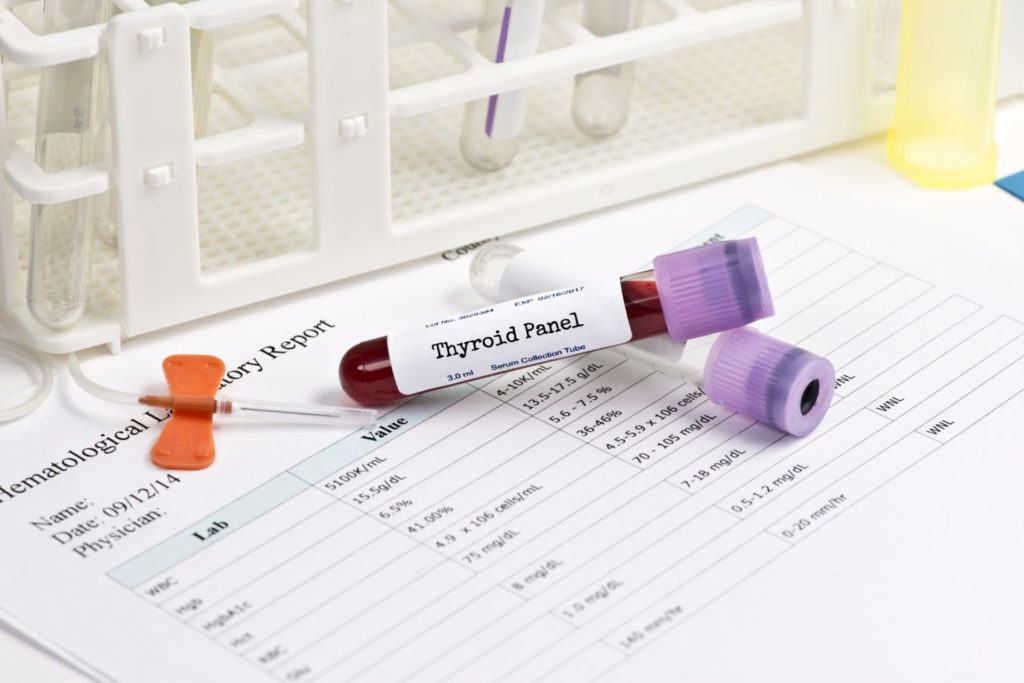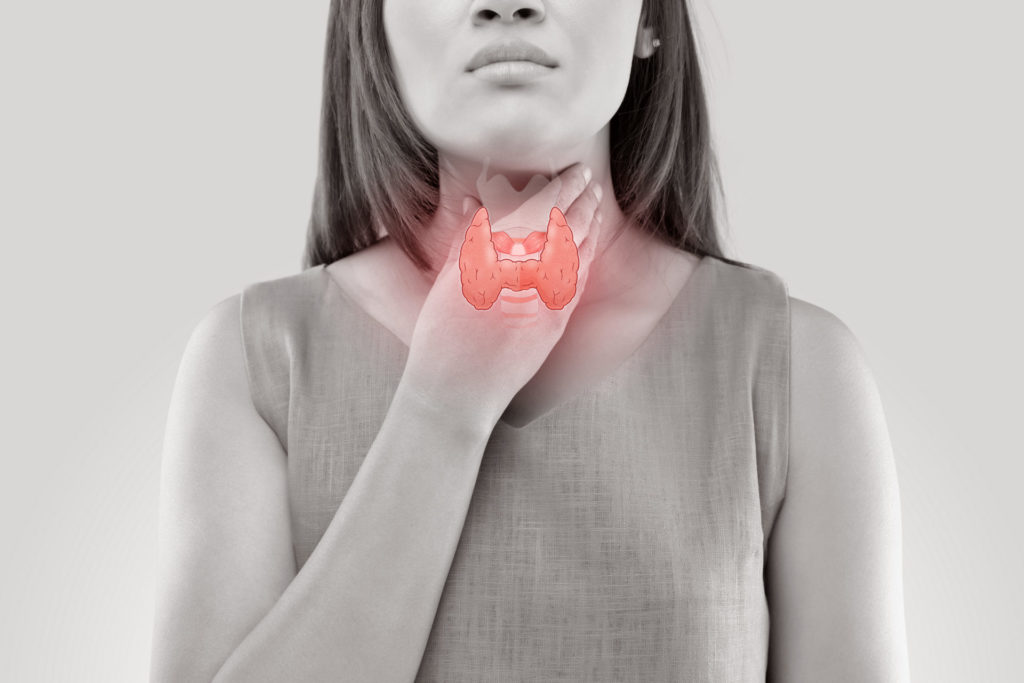
What you Should Know about Thyroid Health and Testing
Making sure your thyroid is working optimally is crucial for your health. I asked Dr. Pouya Shafipour, a thyroid MD over at Paloma health, the most common questions I get asked from my clients. For the sake of keeping this article shorter, this article focuses more on hypothyroidism. This article contains affiliate links.
Page Content
- I have some typical hypothyroid symptoms, but my TSH blood test results came back normal. What is the optimal range?
- Why is it not enough to only get TSH tested?
- What kind of tests should I request to get a full thyroid panel?
- Where can I get a full thyroid panel?
- How do I know that my thyroid medication is working for me?
- I have taken thyroid hormones for a while; how often should I get blood testing done?
- Are there any other tests besides a full thyroid panel I should ask my doctor for if I have a thyroid condition?
- How do I find a doctor who is knowledgeable/up to date in all things thyroid?
- Are there any supplements that are recommended for hypothyroidism?
- What are some underlying root causes that affect thyroid health?
I have some typical hypothyroid symptoms, but my TSH blood test results came back normal. What is the optimal range?
Results from your thyroid blood tests are measured against normal reference ranges, which are based on the average values in a population rather than individualized values. A reference range does not consider the clinical picture of a specific patient. Instead, it is the average values of adults in an area.
So, your results may fall into the normal reference ranges while you still experience signs and symptoms of hypothyroidism. Your optimal range is where you feel your best with the least number of symptoms. To determine the best treatment option to get you into your optimal range, I recommend partnering with a healthcare provider who takes into account your symptoms, medical history, lifestyle, and lab results.
Summary: The normal reference range is a depiction of the average values of adults in an area. Your optimal range is where you feel your best.
Why is it not enough to only get TSH tested?
When it comes to testing, testing for TSH is standard practice in most doctor’s offices. However, testing for TSH alone may not give the complete picture of your thyroid health. Testing for TSH alone may not highlight problems like your body not using available thyroid hormone.
For greater context, it can help to understand how the hypothalamus-pituitary-thyroid (HPT) axis works. The hypothalamus in the brain releases thyrotropin-releasing hormone (TRH). TRH then stimulates the pituitary gland, also in the brain, to release thyroid-stimulating hormone (TSH). Then, TSH stimulates the production and secretion of the thyroid hormones: thyroxine (T4) and triiodothyronine (T3). T4 and T3, in turn, control the secretion of TRH and TSH through a negative feedback loop to maintain the balance of the HPT axis.
With that in mind, you see why testing only TSH does not paint a complete picture of what’s going on with your thyroid function. This leads us to the next question…
Testing for TSH alone does not give the complete picture of your thyroid health.

What kind of tests should I request to get a full thyroid panel?
T4 is the inactive form of thyroid hormone and works as a storage hormone to transport T3 to the organs in your body. T4 must convert to T3 before your body can use it for energy in the cells. T3 is the biologically active thyroid hormone that plays a super important role in all metabolic functions like heart and digestive functions, muscle control, brain development, and bone health.
Testing for T4 helps determine the level of circulating or total thyroid hormone in the body. However, this still may be incomplete information on its own because results can be affected by the amount of protein in your blood. Testing for T3 in addition to TSH and T4 helps to inform how well your body is converting thyroid hormone to the active form.
Each of these thyroid tests on its own is informative but doesn’t paint the whole picture. Instead, these tests can inform your next steps and a personalized treatment plan when looked at altogether.
I also recommend testing for thyroid antibodies. Testing for antibodies can help understand if an autoimmune process is at play that may affect the thyroid. Testing thyroperoxidase (TPO) antibodies can help diagnose Hashimoto’s disease. Testing thyroglobulin (Tg) antibodies can also confirm Hashimoto’s disease, as well as Graves’ disease and postpartum thyroiditis.
Summary: A full thyroid panel should include TSH, free T3, free T4, reverse T3, TPO, and Tg antibodies.
Where can I get a full thyroid panel?
Your doctor can order a full thyroid panel for you. Additionally, many companies offer at-home thyroid tests that you can order on your own and do from the convenience of home. I can recommend Paloma Health’s at-home thyroid test kit, which includes TSH, free T3, free T4, and TPO antibodies, with the option to add on reverse T3 and/or vitamin D.

How do I know that my thyroid medication is working for me?
There are two main ways to tell. Firstly, you will notice if you begin to feel better. Typically, you will want to allow 4-6 weeks for the thyroid hormone to regulate in the HPA axis and to start really working for you. Secondly, you will want to repeat your thyroid function test 6-8 weeks after beginning your new dose. The combination of your labs improving and you feeling better will help you know if the medication is working for you!
I have taken thyroid hormones for a while; how often should I get blood testing done?
I recommend testing your thyroid blood levels every six months unless you are starting or changing medications. In that case, I recommend that you test your thyroid every 6-8weeks until your levels are stabilized.
Are there any other tests besides a full thyroid panel I should ask my doctor for if I have a thyroid condition?
Generally, that should be a good start. Depending on your symptoms and medical history, a doctor may also want to check levels like your iron or ferritin to make sure you are not anemic, some people may want to also get sleep apnea testing done if fatigue is very severe. Additional hormonal testing may be warranted for some and finally, it is good to do a nutritional panel – to make sure your vitamin B12 is in a good place, same with Vitamin D, selenium, and Iodine. These are essential building blocks for thyroid hormone and if they’re not in a good place, it will be hard to get your thyroid to work optimally.
Summary: Checking iron or ferritin, B12, Vitamin D, selenium, and iodine, as well as ruling out sleep apnea (fatigue is severe) can be great additions to a full thyroid panel.

How do I find a doctor who is knowledgeable/up to date in all things thyroid?
Patients with a thyroid condition are often referred to a specialist by their PCP. You can also search online for thyroid specialists. The American Thyroid Association and The American Association of Clinical Endocrinologists both have “find an endocrinologist near me” features on their websites. You can also meet virtually with a thyroid doctor through Paloma Health, the first online medical practice that focuses exclusively on hypothyroidism and Hashimoto’s disease.
When looking for a thyroid doctor, I recommend looking for someone who will be a true partner in your health. Ask yourself:
- Is your doctor kind and compassionate?
- Is your doctor open-minded and willing to listen?
- Does your doctor listen without interrupting?
- Do they give you enough time to ask all of your questions?
- Does your doctor respect your research and input?
- Does your doctor treat your symptoms or only your lab results?
- Does your doctor discuss all options for treatment?
- Does your doctor look comprehensively at your medical history and lifestyle?
- Does your doctor include you in decision-making?
- Can you doctor admit uncertainty when they don’t have a solid answer?
- Do you feel like your doctor is your partner in health and life?
Are there any supplements that are recommended for hypothyroidism?
Some of the vitamins and minerals that I recommend for hypothyroidism include:
- L-tyrosine is an amino acid that is an essential precursor to thyroid and adrenal hormones.
- Magnesium is a cofactor in hundreds of enzyme systems that help to regulate things like blood sugar and blood pressure.
- Manganese is an essential element involved in regulating the metabolism of proteins, carbs, and fats.
- Riboflavin (vitamin B2) is a water-soluble vitamin that can be sensitive to thyroid levels.
- Selenium is a mineral that is a critical component of thyroid hormone metabolism and contributes to the antioxidant defense in the thyroid.
- Vitamin A helps to activate thyroid hormone receptors and regulate T and B cells, reducing the inflammatory response.
- Many patients with hypothyroidism and Hashimoto’s are deficient in vitamin B12 and vitamin D, which may be good to supplement.
- Zinc is a nutrient that helps to regulate both the production and mechanism of thyroid hormones.
Iodine is also an essential element of the molecular structure of thyroid hormones. T4 and T3 are produced by combining iodine and tyrosine (an amino acid). The cells in the thyroid gland are the only cells in the body that absorb iodine. Without iodine, the thyroid gland cannot produce T4 and T3.
However, high iodine concentrations can cause an overabundance of hydrogen peroxide in the body, possibly damaging thyroid cells due to oxidative stress. If an iodine deficiency isn’t the cause of hypothyroidism, it may be unnecessary to supplement iodine.
As always, I recommend you work directly with a healthcare professional to decide which vitamins or supplements may be therapeutic to your particular needs.

What are some underlying root causes that affect thyroid health?
Several things can cause hypothyroidism, like radiation treatment or surgical removal of the thyroid gland, certain medications, or damage to the pituitary gland. However, the most common cause of hypothyroidism in the United States is Hashimoto’s thyroiditis. Up to 95% of those that are hypothyroid may have Hashimoto’s.
Hashimoto’s is an autoimmune condition in which the immune system mistakenly attacks the thyroid gland, eventually causing the thyroid not to produce enough thyroid hormones (hypothyroidism). It’s still not totally clear what causes autoimmune conditions like Hashimoto’s disease.
Most believe that it has to do with a genetic predisposition, intestinal permeability (“leaky gut”) from food sensitivities or nutrient deficiencies, or some kind of environmental triggers like an infection, stress, medications, surgery, or toxin exposure.
The best place to start identifying possible root causes of Hashimoto’s is to reflect with your healthcare provider on your medical history in great detail. This can feel overwhelming, but starting with identifying and addressing even one root cause can impact how you feel. Identifying food sensitivities through the autoimmune protocol (AIP diet) can be a really great place to start.
I recommend working with an empathetic healthcare provider who values (and can interpret) a complete thyroid panel, who treats based on symptoms (not just lab results), and who is willing to dig into your root cause.
HOT TIP: IF you need help implementing the Autoimmune Protocol, and addressing the root cause of getting your body back in balance through nutritional therapy, book a free discovery call.



Add A Comment